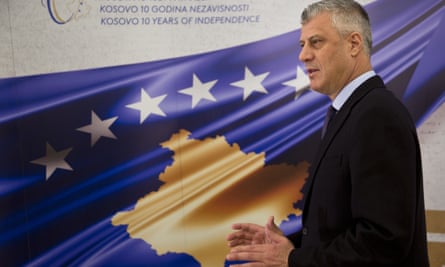The bunting is going up on Pristina’s Mother Teresa Boulevard, stages are assembled for concerts starring the Kosovo-born British singer Rita Ora, and international dignitaries are starting to arrive. On Saturday the small Balkan state marks the 10th anniversary of its declaration of independence, and the air of pride and enthusiasm is palpable.
“Independence was the best thing, the best thing, to happen to Kosovo,” says Granit Miftari, a 27-year-old singer in aviator sunglasses as he passes a stage. “This is one of the best holidays that we can have.”
Among the guests will be Cherie Blair, whose husband is fondly remembered in Kosovo for his leading role in Nato’s intervention in the 1998-99 Kosovo war, which ended the oppressive Milošević regime’s hold on Kosovo and paved the way for independence.
“The US and the UK are the founders of our state,” says Hasan Dotoku, a 67-year-old retired building technician, as he passes by an “Olympic Park” ice rink. “Tony Blair helped us a lot, and children and streets are named after him. We think of him as our man.”
But the joy cannot disguise the serious challenges that the partially recognised country faces, domestically and internationally. Migration, youth unemployment, unresolved alleged war crimes and ethnic division are headaches for Kosovo’s international backers including the UK, EU and US. The territorial disputes over Kosovo seem so intractable that some are floating the idea of a further redrawing of Balkan borders – a move that could trigger a new round of warfare.
“There is a feeling of dignity and pride for Kosovo’s achievements,” says the president, Hashim Thaçi, in his offices in the capital, where the handwritten declaration of independence hangs in a frame on the wall. Thaçi was political leader of the ethnic Albanian Kosovo Liberation Army (KLA) that waged a guerrilla war against the Serbian-dominated Yugoslav state in the late 1990s, culminating in Serb forces’ withdrawal in 1999 after a 78-day Nato bombing campaign.
Thaçi, a tall, imposing figure, lists Kosovo’s accomplishments over the past decade, including building institutions of government, 4% average economic growth, membership of 200 international organisations (from Fifa to the IMF), and recognition by 115 countries.
Leaders in both Kosovo and Albania frame the anniversary as not only a marker of a historic struggle for independence for ethnic Albanian Kosovans but a moment to focus on the region’s EU membership aspirations.
“If a free and independent Kosovo was once the impossible dream of Albanians, it is today a fact of life,” the Albanian prime minister, Edi Rama, said in a statement to the Guardian. “I now hope that before the end of the next decade, Kosovo, Albania and Serbia, all the Balkans as a region, will be fully integrated and members of the European Union. Is it another impossible dream? I don’t think so!”
Bernard Kouchner, a former UN special representative to Kosovo who was French foreign minister at the time of Kosovo’s independence declaration, describes Kosovo as “one of the successes of the UN system”.
“There was a war, a bloody war, and now there is no more war,” he says. Kouchner, an advocate of humanitarian intervention, argues that the “mountains of money and enormous effort” that Kosovo’s western allies have poured into the territory since 1999 have been justified.
“Kosovo is recognisably a state, despite its growing pains following the destruction of its structures before and during the war, and that is no small achievement,” said one EU diplomat. “In 1999, under the UN, it was starting from zero.”
But there is growing disquiet among many Kosovans. The average monthly wage is just €360, and growth is dependent on remittances from the diaspora, with around 80% of foreign direct investment coming from Kosovans overseas – mostly into new houses and flats in Pristina. Unemployment is around 30% and youth unemployment is over 50%.
Kosovo has the lowest average age in Europe, but the economy generates only half the number of jobs annually needed for the young people entering the workforce. Around 190,000 Kosovans are thought to have left in the past decade, despite a strict and unpopular EU visa regime.
And dissatisfaction with wartime politicians who remain in power is rising. Transparency International, an NGO, ranks Kosovo as one of the worst countries in Europe for corruption perception, below many developing-world countries.

“We need to increase employment so people don’t feel they have to escape the country,” says Ismet Gegaj, a 72-year-old retired teacher in a flat cap walking past a vast poster of Ibrahim Rugova, Kosovo’s first president. “But corruption is the cancer of our society. I’m convinced that the people who lead us are not the right people.”
Many in the Balkans blame stagnation partly on the EU and US. “The international community has very low ambitions for us, and is focused on short-term political stability and crisis management,” says Albin Kurti, the leader of the leftwing opposition Vetevendosje party, currently the largest in parliament.
Despite the efforts of its allies, Kosovo remains in international limbo. Serbia does not recognise what it refers to as the “unilateral and illegal secession” and retains a constitutional claim on Kosovo’s territory. Many Serbs see Kosovo as the historic heart of their nation, with some of its most important cultural and religious sites. Some Serbs in Kosovo feel that their rights are not respected, and many refugees have yet to return.
Kosovo is not a member of the UN, with security council members Russia and China blocking its accession. Marko Đurić, the head of Serbia’s office for Kosovo and Metohija (as Serbs refer to the region), points out that countries that do not recognise Kosovo account for three-quarters of the world’s population.
Although the EU has been a crucial supporter of Kosovo, and Pristina aspires to join the bloc, five EU member states do not recognise it.

Kosovo’s international relations have been further complicated by attempts by its politicians to scupper a specialist court established to try former KLA members for alleged war crimes.The EU has made it clear that “normalisation” of relations between Belgrade and Pristina are a prerequisite for Serbia’s EU accession. The ambiguous language makes it unclear whether this will entail Serbia fully recognising Kosovo’s independence.
Meanwhile, Belgrade has launched an “internal dialogue” on the issue, to try to find a mutually acceptable solution.
Attention has increasingly focused on the north of Kosovo, where Belgrade retains significant influence. On the north bank of the river Ibar in the divided city of Mitrovica, the streets are lined with Serbian flags, shops and cafes use Serbian dinars, and Serbian state companies provide many utilities.
“Every Serb says that Kosovo independence is not for us, Kosovo is never going to be independent,” says Dejan Filipovic, a 23-year-old graphic design student. .
But sovereignty is not the only concern here. Nearby graffiti commemorates Oliver Ivanović, a local opposition politician who was killed in broad daylight on 16 January. The killing has been blamed variously on nationalist extremists of either side, agents provocateurs and local underworld figures seen as controlling the region.
Off-the record chatter from diplomats and politicians about a possible partition of Kosovo – with Serbia retaining the far north in exchange for allowing Kosovo to join the UN – has increased in recent months.
But many fear that this could spark a chain reaction and new conflict in the Balkans, with multiethnic Bosnia and Macedonia, and the Serbs of central Kosovo seen as particularly vulnerable to territorial tinkering.
“There would be a new exodus, destruction of heritage, and chaos,” says Father Sava Janjic, abbott of the 14th-century Serbian Visoki Dečani monastery in the snowy hills of western Kosovo. “I can’t believe there are people still proposing this.”
